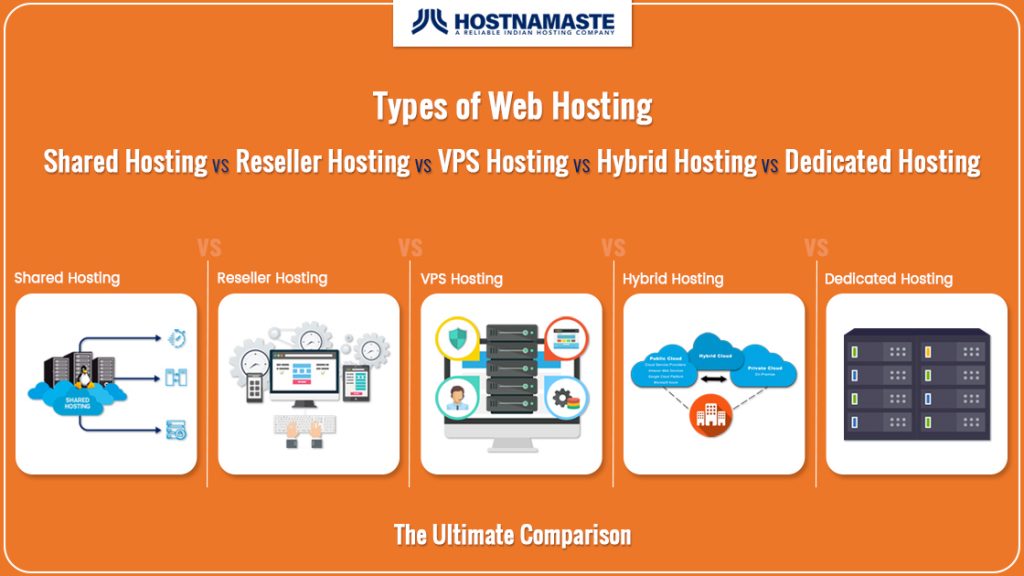
I think as we have evolved, people have now become aware enough to know that Website Hosting is a crucial stage. There are several different types of web hostings available and a lot of users often tend to get confused between them. It’s not much of a big deal; it happens to the best of us.
There is much more to web hosting packages than just the prices. Before you look into the prices and features, you need to grasp the basic concept of each of the hosting service package to determine which one would be best suitable for your business or blog.
Without further ado, let’s compare them and figure out why you should go for each of the following and why you shouldn’t-
Suppose your website was a sport and the RAM, storage, speed, etc. were all players taking part in the game. With that thought, let’s establish that the captain of the team and the biggest player in our match is The Server. Without each of these players, the sport will cease to exist.
Likewise, as the name suggests, the user has to share the server with a bunch of other websites just as the team has to share a singular Captain.
The number of websites hosted on a sole server depends entirely on the hosting provider. While some servers entertain no more than a few 100 accounts, other host thousands of them.
Why do you need it?
For basics, to store your website, of course. Just as humans need a home to unwind, websites are in dire want of a haven where their data could be stored. The server is very much like a computer, except that it is more powerful.
Why Shared hosting is popular amongst users is because it’s very convenient and easy to use. Even amateurs who don’t know a single thing about websites can handle the setup with much ease.
The real dilemma people often face is in this question; why is Shared Hosting suitable for my website? It’s a never-ending debate surrounding Shared, VPS, and Reseller hostings. On top of that, the hosting provider can’t help but make it even trickier by suggesting plans which are of no use to the users.
Shared Hosting is ideal for small websites and blogs that derives a moderate amount of traffic, not encompassing more than 5000 visitors daily. If you’re not yet familiar with the technical side of your website, then Shared is the best choice for you.
Pros-
There are many advantages of opting for a shared hosting plan. Popular beliefs have often led people into thinking that shared hosting doesn’t offer enough resources for a website to perform satisfactorily. Let me tell you; it’s a myth.
Even the cheapest hosts provide a minimum of 100GB of disk space, which for a personal website or blog, is more than adequate. You get RAM as per your package and there’s no issue of bandwidth and CPU power.
Another benefit is that it’s extremely cheap. The server cost is divided amongst many users, hence in just $2-6/mo, you can make your website live with a premium host.
Cons-
Sharing a server with other websites is not necessarily a good thing and has its drawbacks. If you place too many players near the goalpost, it’s bound to create confusion and lag among other teammates.
Similarly, a server has a limited amount of resources and if they are scattered into tiny bits for each customer, it is natural for chaos to uprise. If one website ends up jamming a particular resource, the rest of the users pay the price in the name of Downtime.
Reseller Hosting
Reseller hosting packages consist of the same features that Shared Hosting offers; however, the two are completely different from one another in other factors. Reseller web hosts allow the users to engage their customers and sell hosting packages under their name.
There are some extra tools involved which make sharing hosting space with other users and their own chain of clients possible. The setup is more sophisticated than Shared Hosting and includes enhanced management and control features, such as WHM and Plesk Control Panels and inbuilt billing applications.
Why do you need it?
See, as I said earlier, everyone needs a website. Whether for their personal use, blogging, or for business and organisations purposes. As websites are growing more in demand, people are looking for more and more web hosts in the market.
Reseller hosting, in particular, allows you to purchase hosting packages from a provider and then further sell them to your chain of customers. Reseller Hosting assists you in creating your brand in the hosting industry without having to do all the hard work yourself.
Is it for me?
Are you looking to start a new hosting business with includes minimum start-up costs? Are you one of those people who wouldn’t miss an opportunity to earn easy profit and make a brand of your own?
Well, if you’ve answered both of these questions with a Yes; then reseller hosting is for you. Reseller hosting enables you to act as a hosting company and sell packages to the customers without involving the original provider.
Pros-
There are lots of benefits to being a reseller host. You can start your own hosting company and make money through the profits of each hosting package you sell.
The best thing is that the provider cannot oblige you to fix plans and the prices. You are given free rein, therefore, you can offer the hosting packages by your preference and prices. Reseller packages usually come with billing software which lets you handle your sales. In addition to this, you can even provide a separate control panel access to each of your customers.
Cons-
The success rate of your company and whether it thrives in the hosting market or not, it depends entirely on your original provider. If you went for a company that faces downtime really often, then it’ll look bad for your business’s image. Starting a hosting company requires a great amount of research and precision on your part.
VPS Hosting
VPS, short for Virtual Private Server, is one of the most popular and well-bought hosting services in the market. Now it may look like the client is getting a singular server for his website, but in reality, a Virtual Private Server is just one physical server that gives the representation and features of a private server.
VPS hosting is very different from Shared hosting. Unlike a shared server, VPS doesn’t allow the websites hosted on it to bring down each other if one of them goes faulty. Neither the downtime or the speed are affected in any way.
Why do you need it?
If you feel like you’re not satisfied with your Shared Hosting plan and feel like your business goals don’t require you to share hosting space with other websites, then VPS hosting is what you need.
If you don’t want to face the lag of a Shared Server but cannot yet afford to host a dedicated one, a Virtual Private Server is the one that maintains the balance for you. It allows you to customize your VPS setup suiting your working requirements and the security is way better than a shared server.
Is it for you?
If you’re looking for a reliable and stable hosting package for your website, then yes, a VPS is the one for you. A dedicated Hosting package sounds fantastic, however, it is very expensive and only large organisations go for those packages.
VPS hosting, in simple words, gives you the features of a private server yet cuts down the cost of one.
Pros-
Both in terms of speed and uptime, a VPS package is much more reliable. A Virtual Private Server is not shared among hundreds; the limit is usually 10-30 websites hosted on each server. Even when one website is behaving sluggishly, the rest stay unaffected. Each site is isolated from each other and entertain the utmost privacy.
A VPS acts like a private server when in reality it is a sum of many separate virtual machines so naturally, you don’t have to pay as much for a VPS hosting package than what you’d pay for a dedicated one.
Cons-
In a Virtual Private Server, issues usually arise when the user is not aware of other accounts using the same server. It’s important to know the number of virtual users currently residing in the same Virtual Private Server that you are.
In terms of setup, the technical side of a Virtual Private Server is more complicated than Shared or Reseller Hosting. The user must have some experience to control and manage the server.
Hybrid Hosting
As the cloud infrastructure has taken over the world like a storm, Hybrid Cloud hosting has fully emerged as an excellent choice for IT-driven organisations from all across the globe. Hybrid Cloud Hosting allows businesses to combine the forces of dedicated servers and shared cloud servers, along with each of their storage capacities.
In simpler terms, Hybrid Cloud is better known as the best of both worlds. Each one of private and public clouds is mainly involved and together, as a whole, they create what we best know as Hybrid Cloud Computing.
Why do you need it?
If you aren’t satisfied with the basic cloud hosting packages and wish to cut the costs of renting a dedicated server at the same time requiring the security and reliability, then Hybrid hosting is the one for you. Organisations usually go for Hybrid Cloud Hosting mainly because of its security.
Each company’s website contains information and data that range from not-critical, critical, to highly-critical in that respective order.
The information which needs to be well-protected must be stored under private clouds. However, purchasing private clouds can turn out to be pretty expensive. Hybrid Cloud, on the other hand, allows you to store your most concerned data into the private cloud and the applications and information which shouldn’t violate your privacy are kept under the public cloud.
Is it for me?
A website is a haven for your business. Every delicate piece of information regarding your organisation rests over the hypothetical shoulders of your website. Hence, you must assure that the cloud infrastructure under which you’re storing your website is secure and well-protected from prying eyes and other users.
You can also save money as you are not obliged to pay for the unused storage in the cloud.
Pros-
The biggest benefit of using a Hybrid Cloud Hosting is privacy. Hybrid clouds are secure and hard to penetrate. It’s also cost-effective in the long term as you don’t get to pay for the public cloud storage as long as its absolutely necessary.
Unlike Dedicated Servers, Hybrid Clouds can be installed on machines that are on the premises of your company. This ensures maximum efficiency and performance management.
Cons-
Since Hybrid Clouds are flexible enough to offer an on-premise setup, the installation cost is a tad expensive. Deploying a Hybrid Cloud on the computing machines of your organisation, along with installing and processing the cloud takes quite some time and money.
There are also specific tools which are required in the installation. Suffice to say, if you got a tight setup budget, Hybrid Cloud can be a bit of a problem for you.
Dedicated Hosting
Dedicated Server Hosting is the kind of hosting which is dedicated solely to your organisational needs only. From disk space to CPU usage and RAM, each of the resources is provided to your account only and you don’t need to share hosting space with other accounts, isolated or otherwise.
Do you have one or more websites that are getting a tremendous amount of traffic on them? If so, then renting a dedicated server is the best choice for you. Not just websites, if you’re running a popular application that is critical in terms of security, a dedicated server is the perfect place to host it.
Is it for me?
If you’re looking for complete peace of mind and want a completely remote server that is dedicated to you and your business needs only? Then dedicated servers are the right way to go.
You get complete control of a singular server and get a greater level of security and privacy in return.
Pros-
You are not obliged to share resources with other users, so it’s a perfect place to store your most important asset; data. There are no neighbours so it’s like your own little island of information.
You must know that dedicated hosting is highly customisable. Since you get complete access to it, you are allowed to choose your storage, OS, and even the technology used.
Cons-
The biggest flaw of a dedicated server is the hefty cost. The price is the main reason why many users shy away from it even when they are in dire need of a dedicated server. You’d be hard-pressed to find a premium and reliable host willing to offer the packages at any less than $50-60/mo.
There are also installation charges and occasional extra costs which easily over-weighs the budget often. Companies with a tight-pocket have difficulty affording dedicated hosting services.
Conclusion
Have you decided which of the above hosting is suitable for your website? We sure hope this article plays even a minor role in the process of your decision and helps you understand each of these hosting a little better.





Yay google is my king helped me to locate this outstanding web site!
Glad to hear to hear that you like our blog, Rudden :)
One of the best blog post for the comparison, I understood everything. Thanks a lot.
Thanks for appreciation, Roger.
In this blog, you have nicely explained about the comparison between various web hosting services. It would really helpful for begineers who are looking for best and sutiable web hosting services at an affordable price. Thank you for sharing such informative content with us.
Thanks for the appreciation, coolhandle :)